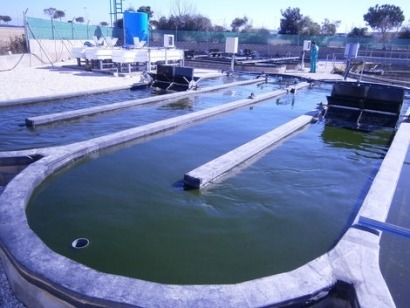
The world’s largest project to convert algae into clean energy using wastewater has successfully grown its first crop of algae biomass at its site in Chiclana, Southern Spain. The EU-backed All-gas project aims to develop low-cost biofuel from algae grown in wastewater and has already completed its two-year pilot phase in a 200 square meter facility.
The All-Gas consortium is led by FCC Aqualia, and comprises five other organisations, from Germany (Fraunhofer – Gesellschaft), Austria (BDI), the Netherlands (Feyecon y Hygear) and the UK (University of Southampton). It essentially uses a waste product – wastewater – alongside carbon dioxide generated by biomass boilers from residual material such as garden waste or olive pits, to feed the algae, which in turn is then converted into biogas with a part of it, consisting of carbon dioxide, separated from the biomethane and recycled. The technology avoids the controversy that surrounds other biofuel projects, many of which are based on large-scale food crops. These have been criticised in recent years for raising global food prices and having an adverse effect on the environment. The All-gas system avoids these issues and also operates self-sufficiently using the energy it produces and being a part of an integrated water management system.
With a methane production capacity of around 200-300 litres of gas per kilogram the first crop of algae biomass possesses a particularly high energy potential relative to its digestibility level and also allows the purification of wastewater to a high standard. Plans for the construction of the biomass plant are already on schedule and a one-hectare prototype under construction. Ultimately the final phase of the project will occupy 10 hectares – the equivalent of ten football fields. It will be the first time that a project of this scale will be implemented. Mexico already has a 6-hectare biofuel production site, but this uses artificial fertilizer rather than waste nutrients. Other facilities of around 10-hectares do exist around the world but they use food-based crops.
“This original new approach to bioenergy means that Spain’s 40 million population could power 200,000 vehicles every year with a single toilet flush” said Frank Rogalla, Project Coordinator and FCC Aqualia’s Director of Innovation and Technology. “The All-gas project is going to change the face of wastewater treatment by generating a valuable energy resource from what was previously considered undesirable waste.”
Around 20 percent of the energy generated in Europe will come from renewable sources by 2020 under current EU plans. When completed in 2016 the €12 million All-gas project project will produce enough power for 200 vehicles with biogas produced during the demonstration phase being used to power public buses and garbage trucks in Cadiz.
Further information:

